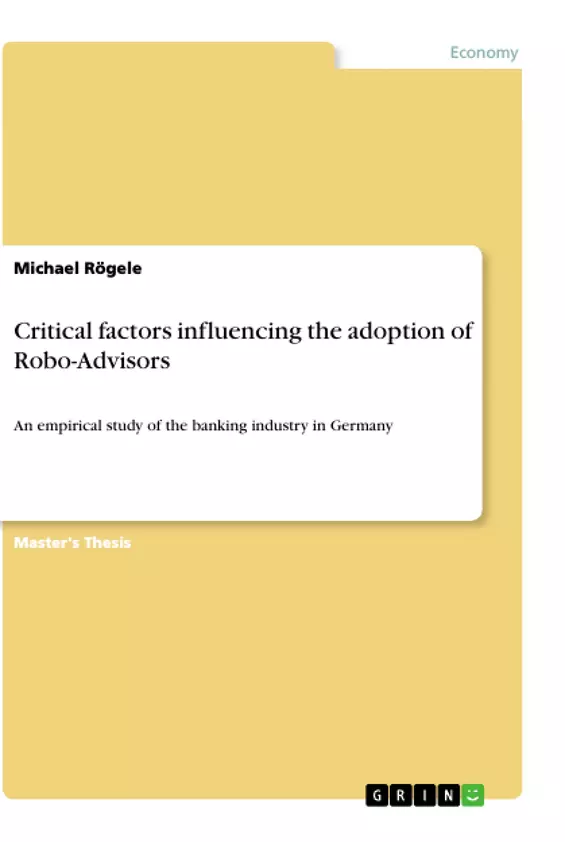This study aims to identify the current state of adoption in German banks and critical factors for traditional institutes that need to be considered when it comes to the implementation of Robo Advisory solutions.
Data were collected via a questionnaire that was filled by banking employees in Germany. Factor Analysis revealed the result that selection criteria are a very important factor for banks when they decide to acquire a Robo Advisory company or cooperate with such a Fintech firm. Especially characteristics like the performance, reputation, willingness to share sufficient information and technological capability of a Robo Advisory company need to be considered. The study also revealed that the IT-infrastructure of traditional banks is often not compatible with the technology offered by Robo Advisors. This can lead to problems in the integration process and need to be an aspect in the initiation phase of such a project.
Robo Advisors are one example of Fintech companies that recently have moved into the financial industry and challenge traditional banking institutes with their business models. Mostly, Fintech companies are only operating in one field of banking and try to attract customers via internet-based offers that focus on simple user interface, efficiency, transparency and automation. Robo Advisors are companies offering automated financial investment tools and can therefore be located in the segment of asset management and investment. Relevant literature has stated the need for traditional banks to react in form of cooperation with such companies, acquisition of Robo Advisors or creation of own automated investment solutions.
Inhaltsverzeichnis (Table of Contents)
- Critical Factors influencing the Adoption of Robo Advisors: An Empirical study of the Banking Industry in Germany
- 1. Introduction
- 1.1. Background of Robo Advisors
- 1.2. Robo Advisors in the German Banking Industry
- 1.3. Research Question and Hypothesis
- 2. Literature Review
- 2.1. Technological Determinism
- 2.2. Diffusion of Innovation Theory
- 2.3. The Adoption of Financial Technology
- 2.4. The Impact of Robo Advisors on the Banking Industry
- 3. Research Methodology
- 3.1. Research Design
- 3.2. Data Collection
- 3.3. Data Analysis
- 4. Results
- 4.1. Descriptive Statistics
- 4.2. Regression Analysis
- 5. Discussion
- 5.1. Implications for the Banking Industry
- 5.2. Limitations and Future Research
- 6. Conclusion
Zielsetzung und Themenschwerpunkte (Objectives and Key Themes)
This research aims to investigate the key factors influencing the adoption of robo advisors in the German banking industry. It examines the current situation of robo advisor implementation by German banks and identifies crucial considerations for traditional institutions when integrating robo advisor solutions. The study utilizes a questionnaire survey to gather data from German bank employees, providing valuable insights into the decision-making processes related to robo advisor adoption.
- Impact of Robo Advisors on the Banking Industry
- Factors Influencing Robo Advisor Adoption
- Technological Integration of Robo Advisors
- Robo Advisor Adoption Strategies
- Implications for the Future of Banking
Zusammenfassung der Kapitel (Chapter Summaries)
- Chapter 1: Introduces the concept of robo advisors and their emergence in the financial technology landscape. It discusses the specific context of robo advisors in the German banking industry and outlines the research question and hypothesis.
- Chapter 2: Provides a comprehensive literature review examining relevant theories, including technological determinism, the diffusion of innovation theory, the adoption of financial technology, and the impact of robo advisors on the banking industry.
- Chapter 3: Outlines the research methodology used in the study, including the research design, data collection methods, and data analysis techniques.
- Chapter 4: Presents the results of the study, including descriptive statistics and regression analysis findings.
- Chapter 5: Discusses the implications of the research findings for the banking industry, highlighting key insights and potential challenges. It also acknowledges limitations and proposes areas for future research.
Schlüsselwörter (Keywords)
This research explores the adoption of robo advisors in the German banking industry, focusing on key factors influencing their integration. It examines technological determinism, diffusion of innovation theory, financial technology adoption, and the impact of robo advisors on traditional banking practices. The study analyzes the decision-making processes of German banks regarding robo advisor implementation, shedding light on crucial considerations such as technological integration, compatibility, and regulatory factors. The findings offer insights into the potential benefits and challenges associated with robo advisor adoption in the German banking context, contributing to a better understanding of the evolving landscape of digital financial services.
- Quote paper
- Michael Rögele (Author), 2020, Critical factors influencing the adoption of Robo-Advisors, Munich, GRIN Verlag, https://www.grin.com/document/916119



